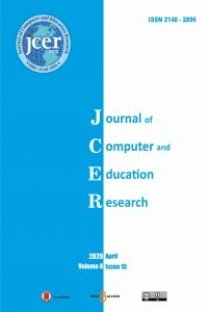The Examination of Prospective Mathematics Teachers' Perceptions of Lifelong Learning Competencies
The Examination of Prospective Mathematics Teachers' Perceptions of Lifelong Learning Competencies
The purpose of this study is to examine the prospective mathematicsteachers' perceptions of lifelong learning competencies. The studygroup of the research consisted of 1st, 2nd, 3rd and 4th yearprospective teachers studying at mathematics education undergraduateprogram of the education faculty of a public university. In this research,cross-sectional research method was used within the scope ofdescriptive research approach in order to reveal how mathematicsteacher candidates' perceptions of lifelong learning competencies haveimproved. In the research, as a data collection tool "Key Competenciesfor Lifelong Learning" scale developed by Şahin, Akbaşlı and YanparYelken (2010) was used. Independent samples t-test and one-wayanalysis of variance (ANOVA) were used to compare the mean scoresobtained from the scale by variables. The results obtained from theresearch indicated that the prospective mathematics teachersparticipated in the research have high level of life-long learningcompetencies. A significant difference was found in prospectivemathematics teachers’ scores of life-long learning competencies asregards their genders and the high schools they graduate from.Participants graduated from Anatolian High School and TeacherTraining High School had higher scores than the other participants.However, no significant difference was found in prospectivemathematics teachers’ scores of life-long learning competenciesregarding the year of their study.
___
- Akbaş, O. & Özdemir, S. M. (2002). Lifelong learning in the european union. Journal National Education, (156), 112- 126.
- Aksoy, M. (2013). Lifelong learning as a concept and european union of lifelong learning adventure. Bilig, 64, 23- 48.
- Akyol, B., Başaran, R. & Yeşilbaş, Y. (2018). Life satisfaction level and lifelong learning tendencies of public education center trainees. Mehmet Akif Ersoy University Journal of Faculty of Education, 48, 301-324
- Bağcı, E. (2011). Lifelong education policies in turkey in the process of evropean union membership. Ondokuz Mayıs University Journal of Faculty of Education, 30(2), 139-173.
- Bauman, Z. (2006). Liquid life. Cambridge: Polity
- Çepni, S. (2018). Introduction to research and project studies. Ankara: Pegem Academy.
- Coşkun, Y. D. (2009). Investigation of lifelong learning tendency of undergraduate students? İn terms of some variables. Unpublished doctoral thesis, Hacettepe Universitesity Social Sciences Institute, Ankara.
- Coşkun, Y. D. & Demirel, M. (2012). Lifelong learning tendencies of üniversity students. Hacettepe University Journal of Education, 42, 108-120.
- Demirel, M. & Yağcı, E. (2012). Perceptions of primary school teacher candidates about lifelong learning, Hacettepe University Journal of Education, 1, 100-111.
- Dunlap, J. C. (2003). Preparing students for lifelong learning: a review of instructional features and teaching methodologies. Performance Improvement Quarterly, 16(2), 6-25
- Gencel, İ. E. (2013). Prospective teachers’ perceptions towards lifelong learning competencies. Education and Science, 38(170), 237-252.
- Güleç, İ., Çelik, S. & Demirhan, B. (2013). What is lifelong learning? An evaluation on definition and scope. Sakarya University Journal of Education, 2(3), 34-48.
- Gür, E. (2014). Factors effecting lifelong learning inclinations of prospective teachers (Doctorate Thesis). Department of Curriculum and Instruction Abant İzzet Baysal University. Karakuş, C. (2013). Lifelong learning competences of vocational school students. Journal of Research in Education and Teaching, 2 (3), 26-35.
- Kılıç, Ç. (2014). Pre-service teachers’ perceptions towards lifelong learning. Journal of Research in Education and Teaching, 3(4), 79-87.
- Ministry of National Education (MoNE) (2014). Turkey lifelong learning strategy document for 2014-2018. http://abdigm.meb.gov.tr/projeler/ois/013.pdf
- Murdoch-Eaton, D. & Whittle, S. (2012). Generic skills in medical education: developing the tools for successful lifelong learning. Medical Education, 46(1), 120-128.
- Oral, B. & Yazar, T. (2015). Examining the perception of prospective teachers about life-long learning in terms of various variables. Electronic Journal of Social Sciences, 14(52), 1-11.
- Poyraz, H. & Titrek, O. (2013). Development of lifelong learning in Turkey. Abant Izzet Baysal University. Journal of Faculty of Education, 13(1), 115-131.
- Samancı, O. & Ocakcı, E. (2017). Lifelong learning. Bayburt Journal of Faculty of Education, 12(24), 711-722.
- Scheuch, K. L. (2007). Faculty research orientation, undergraduate research activities and student outcomes. Unpublished doctoral dissertation, Florida State University, Florida. Selvi, K. (2011). Teachers’ lifelong learning competencies. IJOCIS, 1(1), 61-69.
- Şahin, M., Akbaşlı, S. & Yanpar, T.Y. (2010). Key competences for lifelong learning: the case of prospective teachers. Educational Research and Review, 5(10), 545-556.
- Şahin, Ç. & Arcagök, S. (2014). Examination of the teachers’ lifelong learning competences levels in terms of some variables. Adıyaman University Journal of Social Sciences, 7(16).394-417.
- The World Bank. (2003). Lifelong learning in the global knowledge economy: Challenges for developing countries. A World Bank Report, The World Bank, Washington, D.C.
- Yaman, F. & Yazar, T. (2015). Investigating of lifelong learning tendency of teachers (The example of Diyarbakır). Kastamonu University Kastamonu Education Journal, 23(4), 1553-1566.
- Yıldız-Durak, H. & Şahin, Z. (2018). Investigation of the contribution of coding training in teaching candidates to the development of lifelong learning competencies. Journal of Ege Education Technologies, 2(2), 55-67.
- Yılmaz, M. (2016). Examination of teachers’ lifelong learning tendencies. Mustafa Kemal University Journal of Social Sciences Institute, 13(35), 253-262.
- Yayın Aralığı: Yılda 2 Sayı
- Başlangıç: 2013
- Yayıncı: Tamer KUTLUCA
Sayıdaki Diğer Makaleler
Sınıf Yönetimi Becerisinin Ölçümü: Okul Öncesi Öğretmenleri Üzerine Kesitsel Bir Tarama
The Examination of Prospective Mathematics Teachers' Perceptions of Lifelong Learning Competencies
Murtaza AYKAC, Buket ASLANDAĞ, Davut KÖĞCE
Investigation of Preschool Preservice Teachers' Perceptions of Scientific Knowledge through Metaphor
Serbest Etkinlik Uygulamalarının Sınıf Öğretmenlerinin Görüşlerine Göre Değerlendirilmesi
Mehtap SARAÇOĞLU, Yunus Emre ÇİFTÇİ
Use of Arithmetic Operation Skills in Block Based Programming Environments: A Comparative Case Study
